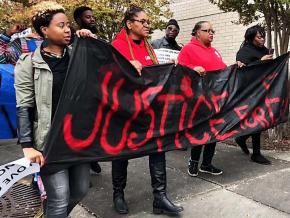Shot in the back by police while trying to help
reports from Alabama as anger at a police shooting in a mall outside Birmingham takes shape into an ongoing campaign to win justice.
MORE THAN 1,000 people attended the funeral of Emantic “EJ” Bradford Jr. in Birmingham, Alabama, on Saturday, December 1. Friends, family and activists came together with a double purpose: to mourn the loss of a loved one and to shine a light on the relentless violence against Black people in the South and across the country.
EJ was killed by police at the Riverchase Galleria mall in Hoover, a largely white suburb of Birmingham, on Thanksgiving night, as shoppers desperately took advantage of the deals on products they’d otherwise be unable to afford other days of the year.
Police shot EJ in the back, believing he was the active shooter who injured two people. In fact, EJ was trying to direct shoppers to a safe location, according to the New York Times. Having already gunned down EJ, police failed to detain a suspect in the shooting that night — federal marshals eventually arrested a suspect.
The highly emotional service took place at Rock Church in Birmingham, Alabama. EJ’s family and friends gave speeches that were variously heartfelt and chilling, and they called on the audience to stand up for what’s right and fight for justice, regardless of whether the national media is paying attention or not.

A private autopsy conducted by a pathologist working for EJ’s family concluded that EJ was shot three times, once in the back of the head, once in the back of the neck and once in his back.
“We believe based on this forensic evidence that [the officer who shot Bradford] should be charged with a crime,” Benjamin Crump, an attorney for the family, said at a news conference. “There’s nothing that justifies him shooting EJ as he’s moving away from him. You’re not a threat when you’re running away.”
Civil rights movement veteran Rev. Jesse Jackson Sr. spoke at the funeral, among many others, echoing calls for Hoover officials to release video from body-cams and mall security cameras of the shooting and all the events at the mall. Calling for the officer who shot EJ to be held accountable. Jackson’s speech ignited a call and response, with the refrain “we want justice now.”
THE POLICE shooting followed an emergency report about the man who opened fire, seriously injuring two people, including a 12-year old girl.
Police claim that EJ — a 21 year old, recently discharged from the U.S. Army — was “brandishing” a gun when officers got to the scene, yet his family says EJ was “shot within milliseconds of police arriving,” Crump said.
Immediately after EJ’s death, people gathered outside the Galleria Mall to protest and demand justice for EJ. Later that evening, a crowd of 100 people, wearing all in black, marched into the mall’s food court, chanting “Hands up, don’t shoot!” — a phrase that still resonates years after Mike Brown’s murder by police in Ferguson, Missouri.
In the following days, hundreds more people would protest at Hoover City Hall, outside the home of the mayor, and at the AMC Patton Creek movie theater, near the mall.
The most immediate demand is to release the bodycam footage and any surveillance footage at the mall, from the hands of the police department.
In the ensuing media frenzy on Black Friday, the Hoover police officers were initially proclaimed to be heroes for acting quickly to stop a bad guy from causing more harm to other shoppers at the mall.
As more evidence emerged proving that EJ was, in fact, attempting to protect people from further violence, the police and the media were forced to admit that they had “killed the wrong guy.”
In an era when the president himself echoes right-wing gun fundamentalists who claim “good guys with guns” can stop the “bad guys,” the hypocrisy is clear.
Any mass shooting situation is fraught with tension, but this incident clearly exposes the racial tensions that lie beneath the surface — and now, loved ones and everyone else in the community are left to pick up the pieces.
Birmingham and the surrounding areas represent one of the largest majority populations of Black people in America. If, as EJ’s death proves, armed police are still the biggest mortal threat to Black people here, then the conclusion must be that no Black person is safe anywhere in America.
The only solution is to keep building a nationwide movement that demands disarmament of the police and accountability for racist murders.


